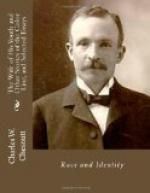The day passed pleasantly down on the breakwater. The weather was agreeable, and the fish bit freely. Towards evening Wellington started home with a bunch of fish that no angler need have been ashamed of. He looked forward to a good warm supper; for even if something should have happened during the day to alter his wife’s mood for the worse, any ordinary variation would be more than balanced by the substantial addition of food to their larder. His mouth watered at the thought of the finny beauties sputtering in the frying-pan.
He noted, as he approached the house, that there was no smoke coming from the chimney. This only disturbed him in connection with the matter of supper. When he entered the gate he observed further that the window-shades had been taken down.
“‘Spec’ de ole ’oman’s been house-cleanin’,” he said to himself. “I wonder she did n’ make me stay an’ he’p ’er.”
He went round to the rear of the house and tried the kitchen door. It was locked. This was somewhat of a surprise, and disturbed still further his expectations in regard to supper. When he had found the key and opened the door, the gravity of his next discovery drove away for the time being all thoughts of eating.
The kitchen was empty. Stove, table, chairs, wash-tubs, pots and pans, had vanished as if into thin air.
“Fo’ de Lawd’s sake!” he murmured in open-mouthed astonishment.
He passed into the other room,—they had only two,—which had served as bedroom and sitting-room. It was as bare as the first, except that in the middle of the floor were piled uncle Wellington’s clothes. It was not a large pile, and on the top of it lay a folded piece of yellow wrapping-paper.
Wellington stood for a moment as if petrified. Then he rubbed his eyes and looked around him.
“W’at do dis mean?” he said. “Is I er-dreamin’, er does I see w’at I ’pears ter see?” He glanced down at the bunch of fish which he still held. “Heah ’s de fish; heah ’s de house; heah I is; but whar ’s de ole ‘oman, an’ whar ’s de fu’niture? I can’t figure out w’at dis yer all means.”
He picked up the piece of paper and unfolded it. It was written on one side. Here was the obvious solution of the mystery,—that is, it would have been obvious if he could have read it; but he could not, and so his fancy continued to play upon the subject. Perhaps the house had been robbed, or the furniture taken back by the seller, for it had not been entirely paid for.
Finally he went across the street and called to a boy in a neighbor’s yard.
“Does you read writin’, Johnnie?”
“Yes, sir, I ’m in the seventh grade.”
“Read dis yer paper fuh me.”
The youngster took the note, and with much labor read the following:——
“Mr. Braboy:
“In lavin’ ye so suddint I have ter say that my first husban’ has turned up unixpected, having been saved onbeknownst ter me from a wathry grave an’ all the money wasted I spint fer masses fer ter rist his sole an’ I wish I had it back I feel it my dooty ter go an’ live wid ’im again. I take the furnacher because I bought it yer close is yors I leave them and wishin’ yer the best of luck I remane oncet yer wife but now agin




